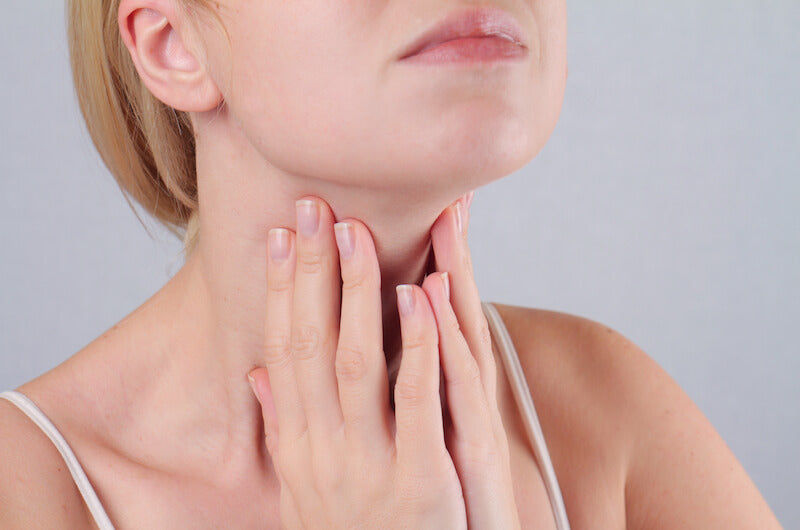| 04. July 2023
Is the thyroid responsible for hair loss?

- The thyroid gland, or more precisely its hormones, are of great importance for the cell metabolism of the hair follicles.
- When thyroid function is overactive, hair tends to become brittle.
- An underactive thyroid leads to hair loss and thinning hair.
- If a new hair cycle begins after diffuse hair loss*, thiocyanate can promote hair growth.
The thyroid plays an important role in human metabolism. Thyroid hormones control a variety of bodily functions and influence growth processes, such as hair cellular metabolism. If the thyroid becomes overactive or underactive, hair growth is severely disrupted.
Thyroid and hair loss
The butterfly-shaped thyroid is a kind of powerhouse for our body. It is located below the larynx, directly next to the trachea. The thyroid hormones T3 and T4 control metabolic processes throughout the body. This is why there are so many different symptoms when the thyroid isn't functioning properly. Those affected by Hair lossThe doctor will therefore also ask you about any dysfunctions of your thyroid gland.
Overactive thyroid (hyperthyroidism)
The most common cause of an overactive thyroid is Graves’ disease, an autoimmune disease. Hyperthyroidism The hair initially grows faster, but doesn't reach its full length because it grows back thinner, is more brittle, and breaks off. Last but not least, the hair cycle shortens. The hair enters the resting phase earlier, detaches from the hair root, and falls out.
Hypothyroidism
If the body suffers from iodine deficiency, the thyroid can no longer produce the hormones T3 and T4. Because our modern diet is varied and contains many trace elements, iodine deficiency is considered to be the cause of Hypothyroidism but is rarely diagnosed. For women with hypothyroidism who are pregnant or breastfeeding, additional iodine intake, for example, with iodized salt, is still recommended.
Chronic inflammation of the thyroid is one of the most common causes of hypothyroidism, even complete thyroid dysfunction. Doctors often diagnose hypothyroidism with Hashimoto's thyroiditis. The thyroid is attacked by the body's own immune cells. The healthy cells initially produce increased amounts of the thyroid hormones T3 (L-triiodothyronine) and T4 (L-tetraiodothyronine or L-thyroxine), then gradually produce fewer hormones as the number of cells decreases.
If too few hormones are released, disruptions in cell metabolism occur at the hair root. The hair feels dry and brittle, prone to matting and breakage. The outer layer of the hair, the cuticle, no longer lies smoothly and flatly against the hair fiber layer (cortex). Because the hair no longer reflects light, it appears dull and matte. Gradually, the hair thins, and its density decreases. Diffuse hair loss as a result of hypothyroidism affects both men and women, but tends to affect women more often because it is not uncommon for women to experience temporary hypothyroidism after pregnancy.
Treatment of hair loss due to thyroid dysfunction
The treating physician (endocrinologist) will always try to balance the function of the thyroid with the appropriate drug therapy for each individual.Affected men and women then lead a largely normal life again without the typical symptoms such as lack of motivation, fatigue, or dry skin in cases of hypothyroidism, or heat sensitivity, nervousness, or heart palpitations in cases of hyperthyroidism. There's also a good chance that their hair will grow back vigorously. A special care product with a patented thiocyanate formula can help with this.
Read by 23,000 people
Do it like 23,000 others and find out how you can improve your hair health - with great offers and discounts as well as helpful advice











